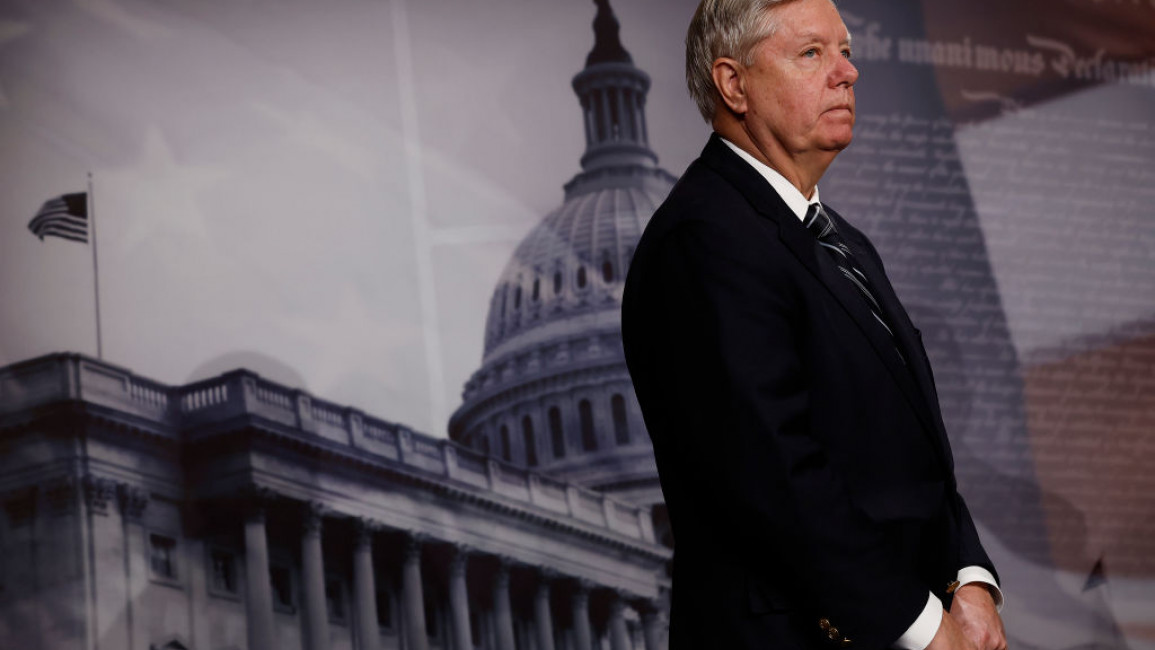US's Lindsey Graham gushes over Saudi Arabia's 'reforms' despite previously calling MbS 'toxic'
US Senator Lindsey Graham has praised Saudi Arabia and its recent "reforms" in an American TV interview - in a dramatic u-turn on previous statements when he condemned the Kingdom and called Mohammed Bin Salman "toxic".
Graham, an ally of former US President Donald Trump, visited Saudi Arabia last week to say "thank you" for their $36 billion purchase of Boeing 787 jets made in his home state of South Carolina, reported Saudi-owned Arab News.
Despite being a vocal critic of bin Salman after the 2018 murder of Washington Post journalist Jamal Khashoggi, Graham drastically changed his tune during his trip, praising Riyadh's Vision 2030 and called for a strengthening of Saudi-US relations.
"If you get nothing else out of this interview, things in Saudi Arabia are changing very quickly for the better," Graham told ABC’s The Week.
"Vision 2030 of the crown prince is real," he said. "Women can drive for the first time in modern Saudi history. Women can go out to dinner without a male escort."
Vision 2030 is a nationwide plan, envisioned by MbS, for Saudi Arabia to reduce its dependency on oil and diversify its economy.
It includes social reforms such as relaxing gender segregation and investment in mass infrastructure projects, such as the building of a new smart city NEOM.
The social changes have not been accompanied by political liberalisation however and hundreds of government critics and activists remain in prison, where they often suffer torture and abuse, according to rights groups.
Graham previously said he would never do business with the country after Khashoggi was murdered in the Saudi consulate in Istanbul in 2018.
Mohammed bin Salman has been directly linked to Khashoggi's death by US intelligence and other organisations which have investigated the matter, although Riyadh always denied the crown prince ordered the journalist's assassination and said the killers had been punished.
However, in an interview on Sunday, Graham said: "I’ve been talking with the Biden administration about working with Saudi Arabia to build on the reforms they’re doing in their country and to build on the Abraham Accords."
Graham said he wanted to be part of the country’s $1 trillion economic transformation, and argued that a stronger US relationship with Saudi Arabia would pave the way for normalisation of the country's relations with Israel.
The 2020 Abraham Accords, brokered under then-President Trump, saw Israel normalise relations with the UAE, Bahrain, Sudan and Morocco. The agreement was slammed by Palestinians as a betrayal of their cause.
The US and Israel have long pushed for Saudi Arabia to join the agreement. Security guarantees from Washington, the green light on a civilian nuclear programme, and the relaxation of rules on international arms sales could incite the Saudis to sign the deal, reported The New York Times.
However, the Saudis have been decidedly cooler on the prospect of the case of Israel with Riyadh repeatedly ruling out normalisation without the creation of a Palestinian state first.
Saudi Arabia has recently re-established diplomatic ties with Iran under a deal brokered by China. This landmark agreement has seen ambassadors from both countries meet and has been followed by efforts to secure peace in Yemen - where Iran-aligned Houthi rebels have fought a Saudi-led coalition supporting the internationally recognised government for eight years.
Saudi Arabia is also currently leading efforts among Arab states to normalise relations with Syria, which has been isolated on the international stage since the outbreak of the brual conflict there in 2011.


![President Pezeshkian has denounced Israel's attacks on Lebanon [Getty]](/sites/default/files/styles/image_684x385/public/2173482924.jpeg?h=a5f2f23a&itok=q3evVtko)



 Follow the Middle East's top stories in English at The New Arab on Google News
Follow the Middle East's top stories in English at The New Arab on Google News


